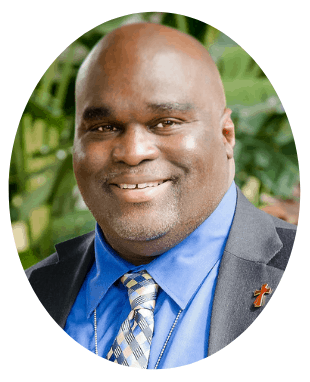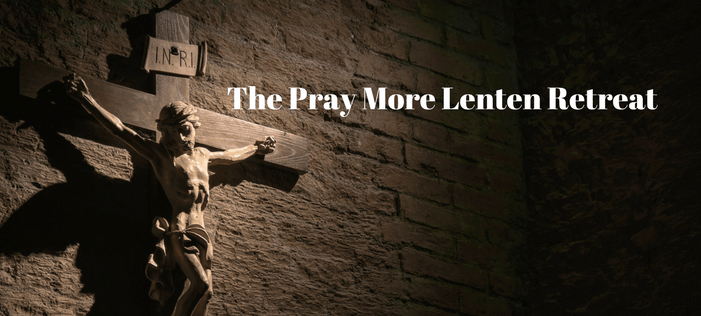Summary
In this talk Deacon Harold Burke-Sivers shares an anecdote that we can learn from and remind us the importance of practicing our faith, our truth. He reminds us that we must vigilant with believing and staying with the one truth in our lives which is the truth of the Lord Jesus Christ.
Thank you for watching and participating in this retreat!
Not Registered, yet? Don’t miss the rest of the talks! Register for the Pray More Retreat!
Downloads
Audio MP3
Click here to download audio file.
Printable Study Guide PDF
Click here to download the printable study guide.
Printable Transcript PDF
Click here to download transcript of the video presentation.
“…God is the source of all truth. His Word is truth. His Law is truth. His “faithfulness endures to all generations.” Since God is “true,” the members of his people are called to live in the truth.”
Rom 3:4; Cf. Ps 119:30
Reflective Study guide Questions
- Saint Paul warns that we shouldn’t feel complacent, too comfortable, or secure — essentially, that we shouldn’t feel convinced that we don’t have anything to worry about. We have to remember that we need, constantly, God’s mercy. When have you become too complacent or too comfortable? How has that affected your life? 2 – What did you do to get out of that?
- God calls us in the circumstances of our lives to pick up our cross and to follow His son to glory. There are a lot of ways to do that: in what way do you know you need to change your life so that you can begin to follow Jesus?
- God will lead those who persevere. He will help them to get out of sin and to grow stronger in holiness. Which area of your life do you need to persevere through right now? Which sins do you need to work on a little longer?
- Deacon Harold says if we allow our faith to fertilize us, we will bear fruit. How have you seen this happen either in your life or in the life of someone close to you?
Text: The Truth Will Set You Free
Opening Prayer
Let us pray. Lord God, we give You honor and praise, glory, blessing, and thanksgiving on this day. You revealed to us in Your Son that He is the way, the truth, and the life. Truth, then, is not an idea that we form in our minds, but a dynamic relationship with the living God. Truth is a person. And Lord, we ask You during this season of Lent to give us, like You gave Elisha, a double portion of Your Holy Spirit, to move us ever closer to You, to move us more deeply into Your heart. So as we receive Your word into our lives, we can then go forward to be living witnesses of Your truth to the world. And we ask this in Your holy and precious name. Amen.
“That’s Not My Truth”
How many times have I spoken to parents whose adult children are away from the faith? They say things like “I don’t know what happened. They went to church with us every Sunday, they went to Catholic school, they went to youth group, and they got confirmed, and I don’t know what happened. Now they’re telling me ‘Well mom, dad, that’s your truth. That’s not my truth. That may be true for you, but that’s not true for me.’” This kind of thinking is so pervasive in our culture today. It’s taken root in so many hearts within our young people, and our young adults, and people of all ages, where they’re deciding what’s true for themselves. Truth is whatever they decide it to be.
St. Leo
This kind of thinking can cause great turmoil not only within families, but also within our culture and society. But this is nothing new. St. Leo the Great faced incredible challenges back in his day as well. During his papacy, barbarian armies actively persecuted Christian communities, while heretics from within the church spread errors and rumors about the person and nature of Jesus. But with steadfast conviction and brilliance, Pope Leo the Great boldly proclaimed the richness, beauty, and truth of Christian belief. When a large army of barbarians came to attack Rome, St. Leo courageously rode out to meet the pagan leader, Attila the Hun, face-to-face, armed only with his great trust in God. Attila admired the pope’s fearlessness, and Leo’s humility and charity earned him great respect among the barbarians. Rome was saved because the pope was willing to give his life to protect and defend the faith.
With the fervor of St. Leo the Great, we must protect and defend the dignity of our life, from the moment of conception until natural death. We must work hard to build strong families against an ever-advancing culture of death. We live in a world of eclipse, in a world consumed by a darkness, whose far-reaching shadows of pornography, and human trafficking, and the so-called redefinition of marriage are cast across the threshold of family life. Our only hope for salvation is in trusting in God’s merciful, infinite love. Through the beauty and truth of our faith, we bear rightness in a convincing manner to the victory of God’s love over the power of evil in ourselves and in the world.
Learning From Moses
We must live our faith with a sense of urgency. St. Paul warns us that we dare not wrap ourselves in the cloak of complacency and comfort, with a false sense of security, convinced that we have nothing to worry about. We must be humble enough to come before God and to admit that we are in constant need of His mercy and forgiveness despite ourselves, lest we, like many of the Israelites wandering through the desert for 40 years, never reach the destination God has promised for us.
Moses, you remember at the burning bush, is afraid to look upon God, the I am who am. He is less than thrilled with the task that God has given him. But he obeys in faith, because he knows that the worst way to go astray is when a person destined by God for a certain path is unfaithful to that call. Therein lies the warning for us. We all like to think of ourselves as people of the resurrection, but there is no resurrection without crucifixion. There is no Easter Sunday without Good Friday. God calls us within the circumstances of our own lives to pick up our cross and to follow His Son to glory. We may fall along the way of life, the cross may get heavy, and we may be tempted to take the easy way out and to put it down. But for those who persevere in God’s love, He will lead them out of the land of sin and despair to a good and spacious land, a land flowing with milk and honey and the reward of eternal life.
Jesus’ warning in the gospel is clear. We must not become cynical. In response to the news that Pilate has had several people executed, and that many were killed by a falling tower, Jesus says that we are in equal danger as long as we continue to separate ourselves from His invitation to loving and life-giving communion when we commit serious sin. He then tells the parable of the fig tree that bears no fruit, and has stretched the owner’s patience to the limit. The tree receives one more chance at the request of the gardener, that perhaps it will bear fruit. If not, it shall be cut down.
We Must Not Become Cynical
Jesus’ warning in the gospel is clear. We must not become cynical. In response to the news that Pilate has had several people executed, and that many were killed by a falling tower, Jesus says that we are in equal danger as long as we continue to separate ourselves from His invitation to loving and life-giving communion when we commit serious sin. He then tells the parable of the fig tree that bears no fruit, and has stretched the owner’s patience to the limit. The tree receives one more chance at the request of the gardener, that perhaps it will bear fruit. If not, it shall be cut down. To reject or even neglect Christ’s call for repentance is to gamble with disaster. We must affirm that personal conversion, that metanoia, that turning our mind around in humility. Those are essential if we are to drink deeply from the wellspring of God’s infinite love, and this is why we have to live the truth.
Learning the Piano
Let’s put it this way. Why is it important to live the truth, and how does that truth lead us to freedom? Imagine you have two friends that are in a car driving somewhere. And as they’re conversing, listening to the radio, this beautiful piano sonata begins to play, by Frédéric Chopin. Both men are so moved by the beauty of the music that they’re hearing that they decide right then and there that they’re going to learn how to play piano. In fact, they’re going to come back a year from now on this very day and to play piano together, to celebrate their triumph in learning how to play.
So they both go home, they both go their separate ways. One friend says to himself “You know what, I’m pretty smart. I don’t need anyone to tell me what to do. I don’t need to align myself with the truths of piano playing. I can teach myself. I’m pretty smart.” So he goes to the piano store and he buys a “How to play piano” book. He puts it in front of him, he says “I have got the piano. Okay, I got this,” and he starts to try to figure it out. Then he gets distracted by life. He gets a phone call. “Hey, I got tickets to the basketball game tonight. You want to go?” “Yeah, let’s do this.” And he goes to the game and, you know, he goes to the game and he enjoys himself. A couple of days later he comes back, “Oh yeah, yeah, yeah. Piano, piano, piano.” And he sits down and starts to learn piano again. Then he gets distracted by something else, then he gets busy at his job, and all of these different things around him happen and he haphazardly teaches himself how to play piano for a year.
Meanwhile, his friend says “You know what? I’m pretty smart, but I don’t know anything about piano. I’m going to hire a teacher.” And so he goes and hires a piano teacher. The teacher teaches him how to sit at the piano, how to hold his hands at the piano, how to read music, what the black keys do, what the white keys do, that there’s middle C, and to the next C is an octave, when you flat the third it’s a minor.
And then he has to learn scales. First he learns major scales, then minor scales, and then he has to practice harmonic minor scales. And then he, as he gets more complicated, Dorian, and Phrygian, and Locrian, and Mixolydian, and the different modes of playing. And he has to practice for 30 minutes a day. Sometimes you don’t feel like practicing, but he said “You know what? There’s 168 hours in a week, and all I have to do is the teacher says to practice 30 minutes a day.” And so he makes that commitment and he does that for a year.
On the anniversary, when they both come back to play that piano sonata that they heard on the radio, the first friend, that one that decided to teach himself, he’s playing. He’s playing, but he’s ultimately frustrated because the music that he hears in his head, he cannot get across on the instrument, and he’s ultimately frustrated. The second friend, the one who hired the teacher, the one who aligned himself with the truths of piano playing is not only playing the notes, but he’s adding maybe a forte here, or pulling back, playing a little softer, pianissimo there. He’s injecting his own personality into the music, because now he’s able to express himself through the music.
Which One Was freer?
So I ask you, which one was freer? Clearly the second one. The first guy thought he was free because he could do things however he wanted. But he ultimately ended up frustrated. But the second friend, he aligned himself with the transcendent principles of piano playing, just like our faith. We are the ones who are learning the faith, and we have the piano teacher, which is our Catholic Church. The rules, the commandments, the catechisms, the moral codes, all of those things teach us, and we have to practice our faith. More than 30 minutes a day of course, but the point is that we are building virtue. The more we practice our faith, we’re building virtue.
And what does that lead to? We’re able to express ourselves beautifully through the instrument of our bodies that express what’s in our souls, what’s in our spirits. That is true freedom, because now we’re free to be the person that God created and calls us to be, precisely because we have followed the ways of God and not the ways of the world. This is the truth that sets us free.
And so, my brothers and sisters in Christ, during this Lenten season, let us open our minds, our heart, and our wills to God’s grace. That we may bring forth a harvest of life-giving communion, and be living, faithful witnesses to the power of Christ’s love to the world. Let us be watered gardens of the Holy Spirit. Let us be like the palm tree and the cedar of the scriptures. That, planted in the house of the Lord, we will flourish in the courts of our God, still bearing fruit when we are old, still full of sap, still green. To proclaim that the Lord is just. In Him, our rock, our salvation, there is no wrong. Let us pray.
Closing Prayer
God, our Father, we bless and glorify and praise You. We thank You for this time together. Lord, as we continue this journey through Lent, let our hearts be open; let our minds be clear; let our bodies, through fasting, be prepared and empty, so that we can be filled with Your love and Your truth and Your salvation. And we ask all this in Jesus’ holy and precious name. Amen.
About Deacon Harold Burke-Sivers

Deacon Harold Burke-Sivers – known around the world as the “Dynamic Deacon” – is one of the most sought-after speakers in the Church today. He is a powerful and passionate evangelist and preacher, whose no-nonsense approach to living and proclaiming the Catholic faith is sure to challenge and inspire those who hear him. He travels across the United States and around the world speaking at conferences, workshops, retreats, parish missions, high schools, and young adult events – in short, to everyone who desires to know Jesus intimately and enjoy a deeper personal relationship with Him. His areas of expertise include marriage and family life, discerning the will of God, the sacraments, male spirituality, pro-life issues, evangelization, prayer, and many others.
Deacon Harold holds a Bachelor of Arts Degree in Economics and Business Administration from the University of Notre Dame, and a Master of Theological Studies Degree from the University of Dallas. He co-hosts the Eternal Word Television’s Network’s popular radio program, “Morning Glory”, and the weekly broadcast “Living Stones” on Mater Dei Radio. Deacon has also appeared as a guest on numerous other national and international radio programs, including “Catholic Answers Live” and “Vocation Boom Radio. Retaining a deep love of Benedictine spirituality which he gained during his time discerning a call to that religious community, Deacon Harold is a Benedictine Oblate of Mt. Angel Abbey. He is also a member of the Fellowship of Catholic Scholars and the Confraternity of Catholic Clergy. Most importantly, he is married to his lovely wife, Colleen, and they have four beautiful children. They live in Portland, Oregon, where Deacon Harold is assigned to Immaculate Heart Catholic Church.

